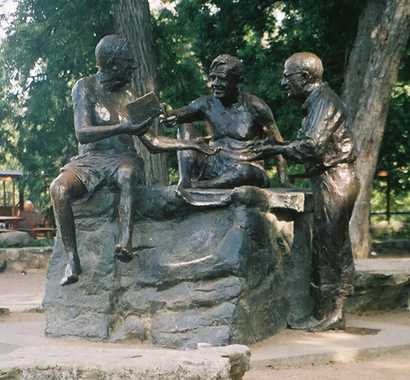Roy Bedichek Texas' Most Civilized Soul. (original) (raw)
Roy Bedichek has been called the most civilized soul Texas ever produced. If that's so - and it has never been seriously disputed - the seeds of Bedichek's civilized nature and his love of the natural world were sown in Falls County, where he grew up.
Roy Bedichek left to Texas two lasting legacies. He was director of the University Interscholastic League for a quarter of a century; in that capacity he set the foundation for the state's UIL competitions in athletics and academics. An Austin middle school is named for him.
| Today he is perhaps best known as the author of Adventures of a Texas Naturalist, a book the late A.C. Greene of Salado included in his The Fifty Best Books on Texas. Of the book Greene wrote: "Without Thoreau's political asides, Bedichek offers nature as the best solution to mankind's private despairs. The book is as fresh today as it might have been if you had accompanied Bedichek on the travels around the state he describes." | | | --------------------------------------------------------------------------------------------------------------------------------------------------------------------------------------------------------------------------------------------------------------------------------------------------------------------------------------------------------------------------------------------------------------------------------------------------------------------------------------------------- | |
Born in Illinois, Bedichek moved to Texas when he was six. He told long time friend and fellow writer William A. Owens his first impression of Falls County in the early 1880s.
"I remember that it was just a bald prairie," he said. "My mother, who had been used to pioneer conditions, cried all the way from the train to the place six miles away that we went to."
The place they went was the community of Blevins, where Roy's father, James Madison Bedichek, founded a school.
Later, the family moved to Eddy where the elder Bedichek founded the Literary and Scientific Institute. The two foundations of Bedichek's life were formed at that early age: a love of reading and a love of the natural world.
Lyman Grant, who co-edited the book The Letters of Roy Bedichek, suggests newcomers to Texas be given a copy of Adventures With A Texas Naturalist along with the hot sauces, pecans, and packets of bluebonnet seeds so often used to characterize the state.
"In (the book's) pages, newcomers can discover the best that Texas has to offer and, if they let it, the kind of person Texas can inspire them to become," Grant wrote.
Bedichek died in 1959, supposedly waiting for his wife's cornbread to come out of the oven. He is buried at the Bruceville-Eddy cemetery. His grave there is marked by a Texas Historical Commission marker outlining his contributions to Texas education and literature.
Filmmaker Ron Tranchin began in Falls County when he set out to trace the many roads Bedichek traveled for his documentary "Roy Bedichek's Vanishing Frontier." Reading Bedichek's book as an adult, Tranchin was reminded of the joy he found in the natural world as a boy. In Bedichek, he discovered a fellow Texan who never lost that joy.
Philosophers' Rock (Click on photo for plaque)
Photo courtesy Chia-Wei Wang, August 2006
Tranchin visited Barton Springs Pool in Austin where a statute of Bedichek, J. Frank Dobie and Walter Prescott Webb commemorates "Philosopher's Rock," the place where the three men often gathered to discuss weighty matters of man and beast.
The filmmaker also pays a visit to an heir of Bedichek's literary legacy, writer John Graves of Glen Rose, who wrote another Texas classic, Good-bye To A River. Like Bedichek, Graves holds a special affection for the mockingbird.
Intrigued by the mutual interest, Tranchin visited a graduate student studying the mating rituals of mockingbirds. He learned that Graves and Bedichek were on to something; there is more to the noisy and ubiquitous bird than meets the untrained eye.
And so it seemed fitting last week at the Bruceville cemetery when a mockingbird alighted atop Bedichek's historical marker. The bird peered down at what was written there, as if reading the words upside down. The bird then flitted away to rest atop Bedichek's headstone.
A photograph snapped to record the symbolic image showed the headstone but no bird. Its shrill, mocking call faded away over a remnant of the old, bald prairie Bedichek first saw more than a century ago.
